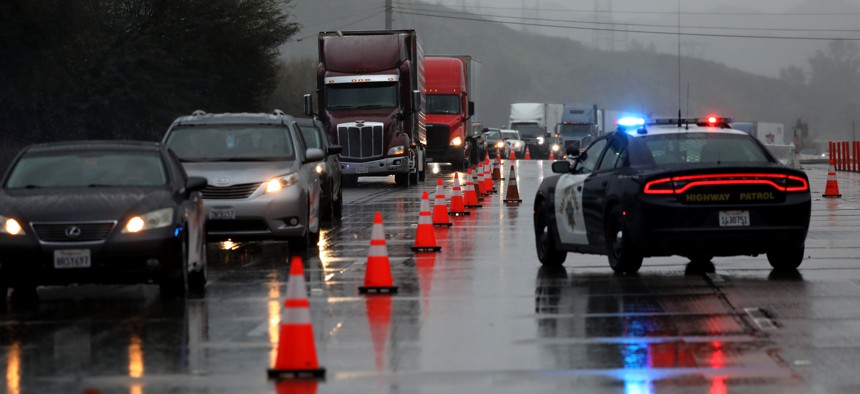Biden Administration Recognizes States’ Role in Highway Spending

Gary Coronado / Los Angeles Times via Getty Images
A new memo from the Federal Highway Administration that replaces one from last year explicitly acknowledges the role of states in deciding how to use federal highway dollars—allaying concerns raised by Republicans in Congress.
The Biden administration on Friday replaced a controversial memo that guided how its primary highway agency handled the rollout of the 2021 infrastructure law, allaying Republican concerns—for now—about federal meddling in state transportation decisions.
Shailen Bhatt, the recently installed head of the Federal Highway Administration, issued a new memo that explicitly recognized the authority of state agencies to decide how to spend federal highway money that Congress allocates to states based on a predetermined formula.
“Different states have different needs when it comes to transportation assets that must be reconfigured and modernized, expanded and added, or retired and replaced,” Bhatt wrote. “FHWA recognizes and values the authority and role of the states in deciding how to prioritize the use of their federal-aid highway dollars and will continue to administer funds and programs consistent with all requisite statutory requirements and considerations.”
The show of deference comes in response to an earlier FHWA memo, issued in December 2021, that encouraged the agency’s employees to promote the Biden administration’s stated goals such as upkeep of current roads, reducing the harms created by greenhouse gas pollution, advancing racial equity and improving roadway safety.
Stephanie Pollack, who was then the deputy administrator who led FHWA, wrote the 2021 missive. She and other Biden administration officials maintained that they still recognized the authority of state transportation departments to select their own projects. But Pollack also suggested that some proposals—like widening highways—would receive more scrutiny, while others—such as bike and pedestrian infrastructure—would be subject to less project-by-project scrutiny.
Many Republican officials complained that the 2021 memo was an attempt by the Biden administration to add conditions to the bipartisan infrastructure law that Congress had considered but ultimately rejected.
U.S. Sen. Shelley Moore Capito of West Virginia, the top Republican on the Senate’s environment and public works committee who helped negotiate the 2021 infrastructure deal, led an effort to get Congress to overturn the Pollack memo.
Capito and U.S. Rep. Sam Graves of Missouri, the top Republican on the House committee overseeing transportation and infrastructure, cheered the replacement of that memo.
“Today is a win for states, communities and millions of Americans who stand to benefit from the flexibility provided in the Infrastructure Investment and Jobs Act,” they wrote in a joint statement. “By issuing a revised memorandum, FHWA admitted that it was wrong in their attempts to undo the flexibility provided to states in the law by establishing preferences for certain policies and projects. We’re pleased FHWA recognized that when it comes to legislation of any kind that is passed and signed into law, an administration cannot ignore the role and will of Congress.”
The two promised “to conduct rigorous oversight and ensure the infrastructure law is being implemented as Congress intended.”
U.S. Sen. Tom Carper, a Delaware Democrat who chairs the Senate Environment and Public Works Committee, said the new memo was simply “reaffirming” existing Biden administration policy.
“As a recovering governor, I’m encouraged by the Biden administration’s commitment to implementing the Bipartisan Infrastructure Law in a way that addresses our most pressing transportation challenges and provides clarity for states,” he wrote in a statement. “Investing in roads, highways, and bridges should always be an area where we can find common ground. I hope that this updated guidance can help alleviate any concerns as we continue working together to address our nation’s infrastructure needs.”
Bhatt’s memo does reiterate the transportation goals of the administration, including the “safety, resilience and equity in the delivery of the federal-aid highway program.” But he stressed the role of states, tribes and local governments in carrying out those goals.
“Together we will help state departments of transportation and other entities deliver good policies, programs and projects for the American people as we undertake this transformational work,” Bhatt wrote.
Pollack, in the meantime, has moved to another job in the federal Transportation Department. She started work in January as the coordinator for project delivery support in Secretary Pete Buttigieg’s office, where she is charged with helping grant recipients go through the often-arcane federal funding and project delivery process.






